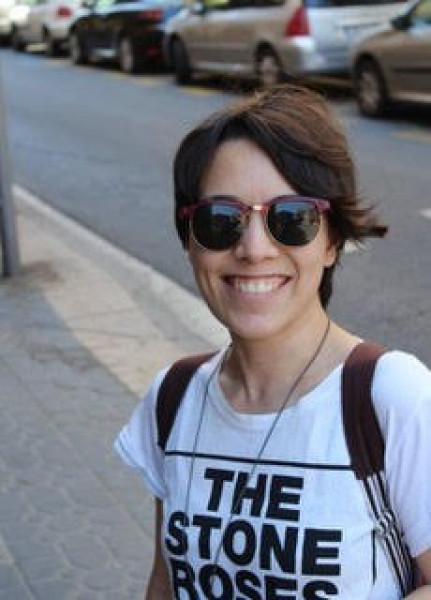
Interview with Cecilia, a content writer managing her remote career in Dubai
How did you get started with remote work?
I started working remotely in 2016, but I tried to work as a freelancer for several years before that.
In 2010, around the time I graduated from university, I set up a simple website to promote my proofreading services. Unfortunately, I didn't know how to promote myself and was too shy to put myself out there.
In 2015, after completing my master's degree and returning to my country to find work, I joined a few marketplaces to start finding freelance jobs. And I did! The jobs weren't very well-paid, but I did have the chance to work with good clients, and the workload was light enough that I could combine it with my office job at an advertising agency.
I started translating blog posts for a small real estate company in Spain, as well as writing blog posts about lots of different topics—from nutrition to rugs!
The next year, I found a remote position as a moderator for a client in Belgium.
Since then, I've worked with more clients to the point I was able to quit my office job in 2018 to go fully remote.
Read 114 answers from other remote workers
What are you working on?
I'm working with a few wonderful clients at the moment. I'm working with the marketing agency Adapt Worldwide writing content for one of their clients, moderating content for the educational platform Skillshare, and helping Wonderbly's customers over social media and email.
I'm also working on a couple of personal projects. I update my blog Remote Millennial once a month and am currently setting up a newsletter on Substack and another blog to put my short stories out there.
Finally, I'm doing my best to remain involved in the remote work community. You'll probably see me on Twitter chats about freelancing and social media sharing what I've learned over the years and gaining valuable insights from people with more knowledge and experience.
Read 107 answers from other remote workers
What's your typical work routine?
I like to plan my day the night before, so when I wake up the next morning, I'll have a pretty good idea of what I can expect and what needs to be done.
I wake up at about 6 or 7 am. Sometimes I may go for a walk if I wake up early enough, but most of the time, I just go straight to making breakfast and writing my morning pages. There, I write down my long-term goals and what I can do today to achieve them, and then I add whatever's on my mind at that moment.
Then, I start working at about 8 or 9 am, depending on the amount of work.
The first thing I do is to block all distractions and set a timer to work in blocks of 25 minutes. After one or two blocks, I take a break.
I eat lunch at home. Since I enjoy cooking, it's not a problem for me to make a quick meal. After my lunch break, I work for another couple of hours, until 5 pm. After that, I may go out for a run or to a yoga class.
In the evenings, I still have to work for about an hour for a client located in the US. But when I'm done with my evening tasks, I can relax or spend some time working on personal projects, like writing a blog post or a short story.
Read 92 answers from other remote workers
How has your routine changed over time?
My routine changes regularly, to be honest. It depends on how much work I have, my energy levels, and even the weather!
For example, it's November now, which means the weather in Dubai is perfect for outdoor activities. This means I don't need a longer lunch break to go to the gym before it gets too crowded. In turn, I can finish my work earlier in the afternoon and then go out for a run.
I'm very mindful of how productive I am and make little adjustments to my routine to find something that works better.
Last year I was working very early in the morning, sometimes as early as 6 am. But this year, I noticed I wasn't particularly productive so early in the morning anymore. So, I changed my schedule accordingly.
Read 22 answers from other remote workers
Do you have a dedicated space to work?
My freelance license in the UAE includes an office space open 24/7, but I don't go there every day. It's well-equipped but often colder than I'd like.
Most days, I work from my dining table or a coffee shop closer to my apartment.
Read 93 answers from other remote workers
How do you stay on task?
First of all, by blocking all distractions using the apps, I mentioned above.
However, I believe distractions are not a sign of laziness, but fatigue or boredom. So when I notice I'm getting distracted, I just take a 10-minute break.
That means getting up and away from my computer. I make tea, get a snack, or even stand in the balcony for a few minutes. I've found that to stay creative and focused; it's better to take breaks rather than force myself to stay on task when my mind is telling me it needs some rest.
Also, when I notice I'm distracted, I remind myself of my priorities. Is Instagram more important than my work? If it isn't, why am I spending time on Instagram when I need to be working? There's a time to scroll through my social media feeds, and there's a time to work.
Read 100 answers from other remote workers
What do you like about remote work?
I think it's a fantastic option for many people. It gives us more flexibility and more control of our schedule. It eliminates the commute and creates opportunities for people with disabilities and parents with young children.
It's presented us with more options to work with amazing companies anywhere in the world and develop our creativity in unexpected ways.
However, I don't think it's for everyone. For other people, going to an office works just as well, and that's okay.
Read 106 answers from other remote workers
What do you not like about remote work?
The only thing I don't like about it is that working from home often means blurring the lines between personal time and work time. It's a lot harder to disconnect when your office is at home.
Read 103 answers from other remote workers
What tools do you use to stay productive?
I use many tools to stay productive!
To name a few, I use the StayFocusd extension for Chrome to block distracting websites and Qbserve for Mac track of how I spend my time on the computer. I'm a big fan of the StayFocusd nuclear option to block all sites except those I've whitelisted.
To keep me from getting distracted on my phone, I use App Detox to block distracting apps and Fabulous to create good productivity habits.
Although sometimes, what works best for me is as simple as turning off my phone and the wifi.
Read 108 answers from other remote workers
Do you have any advice for remote workers?
My advice is to upgrade your skills frequently. You can do this by working on a personal project, taking online courses, attending events with experts in your industry, and staying on top of the latest trends in your industry by setting up Google Alerts.
Remote work requires people to adapt very quickly to new tools and processes.
The more familiar you are with all the tools of your trade and the more practice you have with learning new skills quickly, the better you'll be at your job.
Read 39 answers from other remote workers
How do you decide priorities?
My priority is client work, even though it's challenging to combine it with my personal projects. But by focusing on doing my best work for my clients, I can build better relationships with them, learn more every day, and make a good name for myself that my clients can stand behind.
Read 40 answers from other remote workers
How do you know when to push yourself vs rest?
That's the million-dollar question! I'm still learning to pace myself and find that balance between challenging myself while remaining kind to myself. I can be hard on myself sometimes and feel bad because I'm not doing everything I'd like to do in one day.
It's all about being mindful. Your mind and your body are continually telling you what they need. Unfortunately, we ignore this more often than we should.
A good sign for me to know when it's time to slow down is when I start to find it hard to concentrate on my work. As I mentioned before, distractions are a sign that there's something else going on.
We may be tired, bored, hungry, sad, or preoccupied with other things. When this happens, I know it's time for me to take a break, or to wrap up work for the day.
Read 23 answers from other remote workers
How does working on your own projects help your freelance work?
Other than being a creative outlet, it helps to build a network and continually hone in my skills. It's even helped me find clients!
Read 9 answers from other remote workers
What did we forget to ask Cecilia Morales?
At RemoteHabits we're always trying to improve our interviews, what question should we have asked Cecilia Morales?
Biography
Cecilia Morales
Cecilia Morales is a remote content writer and social media manager based in Dubai. She's interested in telling stories and finding the best ways to tell these stories. In her spare time, she enjoys taking photos, live music, and writing short stories and on her blog, Remote Millennial.
Work remotely? Share your story on RemoteHabits!
Want to be interviewed? If you have a remote position, head over to the interview me page!
Looking for a remote job?
RemoteHabits Jobs has everything you need to find your next great remote work position!
Related Interviews
Interview with Ayesha, a freelance writer that gained early clients through her blog
Ayesha is a freelance content writer—learn how she made the leap to remote work while building her blog and raising her family
Interview with Dani and Luca, digital nomads who have mastered work and travel
Dani and Luca have mastered the art of traveling while working—see their hacks & tips for thriving as digital nomads.
Interview with Alaina, a nonprofit program state director
It takes a minute to find your rhythm in a new remote position—hear how Alaina organizes her time to hit the ground running in a new remote work job.


